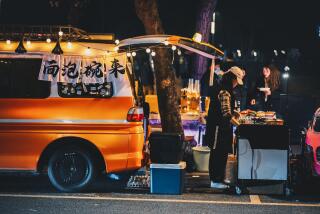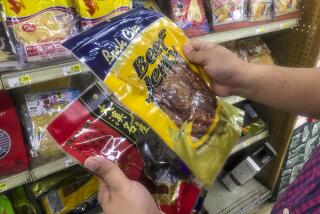In China, what you eat tells who you are
- Share via
Reporting from Beijing — At a glance, it is clear this is no run-of-the-mill farm: A 6-foot spiked fence hems the meticulously planted vegetables and security guards control a cantilevered gate that glides open only to select cars.
“It is for officials only. They produce organic vegetables, peppers, onions, beans, cauliflowers, but they don’t sell to the public,” said Li Xiuqin, 68, a lifelong Shunyi village resident who lives directly across the street from the farm but has never been inside. “Ordinary people can’t go in there.”
Until May, a sign inside the gate identified the property as the Beijing Customs Administration Vegetable Base and Country Club. The placard was removed after a Chinese reporter sneaked inside and published a story about the farm producing organic food so clean the cucumbers could be eaten directly from the vine.
Elsewhere in the world, this might be something to boast about. Not in China. Organic gardening here is a hush-hush affair in which the cleanest, safest products are largely channeled to the rich and politically connected.
Many of the nation’s best food companies don’t promote or advertise. They don’t want the public to know that their limited supply is sent to Communist Party officials, dining halls reserved for top athletes, foreign diplomats, and others in the elite classes. The general public, meanwhile, dines on foods that are increasingly tainted or less than healthful — meats laced with steroids, fish from ponds spiked with hormones to increase growth, milk containing dangerous additives such as melamine, which allows watered-down milk to pass protein-content tests.
“The officials don’t really care what the common people eat because they and their family are getting a special supply of food,” said Gao Zhiyong, who worked for a state-run food company and wrote a book on the subject.
In China, the tegong, or special supply, is a holdover from the early years of Communist rule, when danwei, work units of state-owned enterprises, raised their own food and allocated it based on rank. “The leaders wanted to make sure they had enough to eat and that nobody poisoned their food,” said Gao.
In the 1950s, Soviet advisors helped the Chinese set up a food procurement department under the security apparatus to supply and inspect food for the leadership, according to a biography of Mao Tse-tung written by his personal physician. Lower levels of officialdom were divided into 25 gradations of rank that determined the quantity and quality of rations.
In modern-day China, it is the degradation of the environment and a limited supply of healthful food that is fueling the parallel food system for the elite.
“We flash forward 50 years and we see the only elements of China society getting food that is reliable, safe and free of contaminants are those cadres who have access to the special food supply,” said Phelim Kine of the Hong Kong office of Human Rights Watch.
In the capital, special supply farms are located near the airport, home to wealthier expatriates and many international schools, and to the northwest, beyond the miasma of pollution emanating from the overcrowded, traffic-choked central city.
In the western foothills, the exclusive Jushan farm first developed to supply Mao’s private kitchen still operates under the auspices of the state-run Capital Agribusiness Group, providing food for national meetings. A state-owned company, the Beijing 2nd Commercial Bureau, says on its website that it “supplies national banquets and meetings, which have become the cradle of safe food in Beijing.”
The State Council, China’s highest administrative body, has its own supplier of delicacies, down to salted duck eggs.
“We have supplied them for almost 20 years,” said a spokesman at the offices of Weishanhu Lotus Foods, in Shandong province. “Our product cannot be bought in an ordinary supermarket as our volume of production is very little.”
Organic farmers say they face pressure to sell their limited output to official channels.
“The local government would like us to give more products to officials and work units, but we think it is important that individuals can enjoy our product,” said Wang Zhanli, whose organic dairy in Yanqing, just beyond the most frequented tourist sections of the Great Wall, received certification in 2006.
At his Green Yard dairy, the technology is imported from Holland. The cows graze on grass free of pesticides and are milked in a sterile barn by women in white caps who look more like laboratory aides than milkmaids.
On their organic diet, the cows produce about half the volume of conventional dairy cows, meaning that the supply is never enough, especially since the 2008 scandal in which tainted milk left six Chinese babies dead and sickened 300,000 people. Managers at the dairy say about two-thirds of their product goes to officials, state-owned enterprises, embassies and international schools. A limited quantity is sold at diplomatic compunds and a few select health food stores at prices nearly triple that for regular milk.
“We’re not Switzerland. Our population is way too big for everybody to eat organic food,” said Hou Xuejun, general manager of the Green Yard dairy.
The continued existence of the tegong, or special supply, is treated with secrecy because of public resentment over the privileges of the elite. After the Southern Weekly, a hard-hitting Guangzhou-based newspaper, published the story about the customs farm, the Central Propaganda Department banned further reporting on the subject and the article was removed from the newspaper’s website.
The customs department said it did not own the farm but had signed a 10-year lease to buy vegetables.
“Because of this deal we were able to have a stable supply of vegetables for the past years and we can pay for these items at much lower costs even when the price of food is rising so much nowadays,” customs spokeswoman Feng Lijing said.
The last year has seen dozens of stomach-churning scandals about tainted food. Last month, 11 people in western China died after consuming vinegar contaminated with antifreeze. Each new scandal redoubles the demand for safe food.
Although organic produce stores are cropping up in Shanghai and Beijing, prices are high. Desperate for clean food at affordable prices, some Chinese families have formed cooperatives to buy directly from farmers — their own version of special supply.
“There is not enough supply of organic food, there aren’t so many farmers who really know how to produce organically, and if you found a farm, it is too expensive for ordinary people,” said Liu Yujing, a Beijing homemaker who founded a 100-family cooperative last year.
The mother of a 4-year-old girl, Liu was motivated by the revelations of melamine-tainted milk. “I know you can buy some organic food in shops, but I don’t trust that either. We’ve heard a lot of them are fake.”
China’s sports teams have enacted strict bans on athletes eating pork because of the fear that clenbuterol, a common but illegal steroid fed to pigs, can cause false positives on drug tests. Female judo champion Tong Wen was banned from competing internationally last year after a test showed traces of the drug, but the ban by the International Judo Federation was overturned in February after she said she had never knowingly ingested clenbuterol.
“Now we have a special team that takes care of procuring food. We are more cautious than ever before. We buy pork only from organic farms through a channel that the government has approved,” said judo coach Wu Weifeng.
Much of the pork for the elite is procured through the 2nd Commercial Bureau, which has a subsidiary that slaughters 50,000 pigs a year at a farm in Sanhe, Hebei province, according to Caixin, a business magazine.
The magazine said most of the pork went to the special supply and quoted a manager as saying, “Sometimes raising pigs is about politics too.”
Nicole Liu of The Times’ Beijing bureau contributed to this report.
More to Read
Sign up for Essential California
The most important California stories and recommendations in your inbox every morning.
You may occasionally receive promotional content from the Los Angeles Times.










